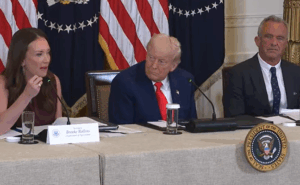Making the announcement at the White House with President Trump, Health and Human Services Secretary Robert Kennedy said the report is a call to action for common sense. “It’s common sense that we can celebrate the innovations of modern life while also demanding fearless inquiry into ameliorating the negative effects of medication, agriculture and farming practices,” said Kennedy.
Secretary of Agriculture Brooke Rollins stressed the role of farmers and ranchers in the MAHA movement. “We all know that at the center of making America healthy again is making American agriculture great again,” said Rollins.
“I have to say we have the greatest farmers in the world and we love our farmers and we want to pay respect to our farmers and we always will,” said President Trump as he introduced Sen. Roger Marshall (R-KS), who also stressed the farmers’ role.
“It does start with the farmer, it starts with soil health and I just want you to know that our farmers are so committed to this as well and and so many of them are already doing great things,” said Marshall. “They’re making the soil healthier, they’re using less pesticides, they’re doing all the right things. It’s going to take a little bit more effort and time to get everybody with those practices. But the American farmer and rancher were the original environmentalists, the original conservationists.”
Listen to the announcement here:
MAHA Report Announcement 19:54
The report itself talks about the potential health issues in children exposed to chemicals such as pesticides, but makes it clear that food production needs must be weighed. “American farmers rely on these products, and actions that further regulate or restrict crop protection tools beyond risk-based and scientific processes set forth by Congress must involve thoughtful consideration of what is necessary for adequate protection, alternatives, and cost of production. Precipitous changes in agricultural practices could have an adverse impact on American agriculture and the domestic and global food supply. The federal government will continue to regularly review the safety of these important crop protection tools.”
Despite such assurances, agricultural groups have been unanimous in raising concerns about the report.
American Farm Bureau Federation – “It is deeply troubling for the White House to endorse a report that sows seeds of doubt and fear about our food system and farming practices, then attempts to celebrate farmers and the critical role they play in producing the safest food supply in the world.”
National Corn Growers Association – “The Make America Healthy Again Report is filled with fear-based rather than science-based information about pesticides. We are deeply troubled that claims of this magnitude are being made without any scientific basis or regard for a long history of EPA expert evaluations of these products.”
National Association of Wheat Growers – “NAWG is deeply concerned with the content and implications of the MAHA Commission’s report…Unfortunately, the report contains misleading claims that could undermine public trust in our nation’s food system.”
National Council of Farmer Cooperatives – “We have serious concerns over the assessment’s allegations about pesticides. The report includes statements that do not reflect the wealth of evidence developed over decades by federal agencies such as the EPA and USDA on the safety of crop inputs and food production methods.”
National Farmers Union – “Disregarding the expertise of respected regulatory bodies and leaving farmers out of the conversation undermines public trust and puts the future of American agriculture and rural economies at risk. We urge the administration to include the voices of family farmers and ranchers as they continue this work and to ensure that solutions are rooted in sound science, fairness and transparency.”
National Cotton Council. “Crop protection tools such as glyphosate are vital for the continued sustainability of family farms here in the U.S. We urge U.S. agencies to continue to allow sound science to guide future policy decisions, and America’s cotton industry needs a seat at the table in this effort going forward.”
Agricultural Retailers Association – “Without pesticides, farmers will struggle to control invasive insects and plant diseases, particularly those affecting perishable crops like fruits and vegetables. This would result in reduced food availability, diminished quality, increased consumer costs, and heightened food safety risks.”

